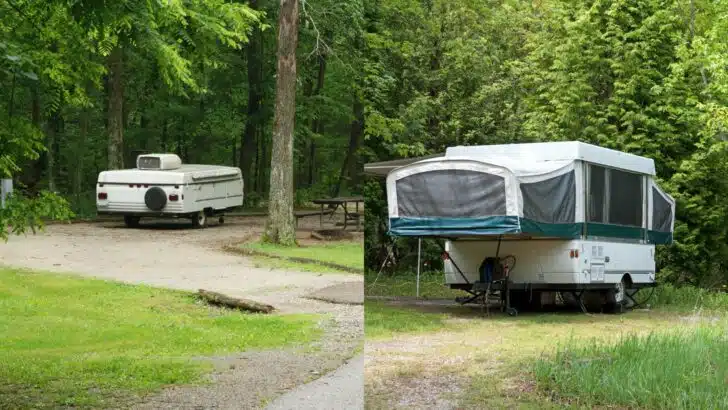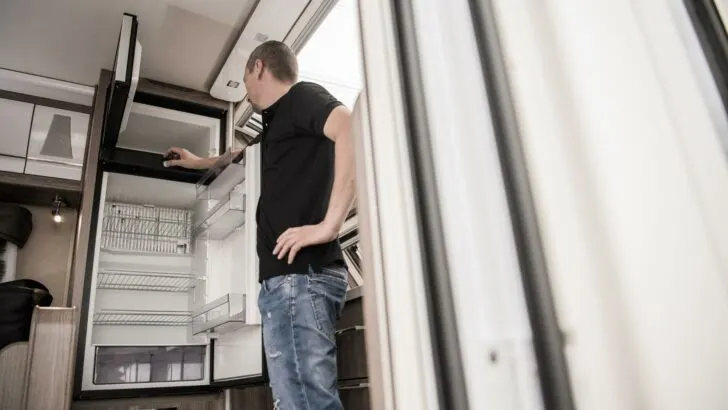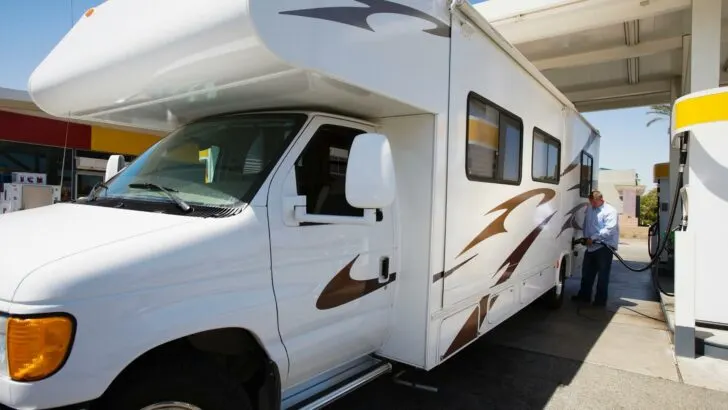Traveling in an RV is fantastic. Obviously, we think so or we wouldn’t have continued doing it for two decades! But, RV ownership isn’t all glamour and fun. There are some stressors involved. So, in the interest of full disclosure, today’s post takes a serious look at a few important things to know about owning an RV before you own an RV.
Let’s get to it!
What Should I Know Before Buying an RV?
As RV owners ourselves, we really do love most things about the RV lifestyle. We love to travel, we love the open road to adventure after adventure, and we even enjoy working from an office where our backyard is a lake, a desert, a forest, a beach, or a national park. There’s really nothing quite like having a home on wheels.
And we’d love for you to enjoy RVing, too. But before purchasing an RV, there are three important things to know about owning an RV.
All RVs Are Not Created Equal
There are many different types of RVs on the market. The type of RV you buy needs to match your family and your travel style.
Before buying an RV, you need to give serious consideration to what you intend to do with it. There are a variety of types/classes of RVs from which to choose, and buying the right one is important. When people ask us what the best size or type of RV is, we always suggest getting the smallest RV you can be comfortable traveling in.
Of course, this will depend on your personal situation: you may be traveling solo, or you may be traveling with a spouse, five kids, and 3 dogs! The number of people who’ll be living or traveling in the rig is an important consideration. The type of RV you’re comfortable driving or towing is important as well!
Next, you need to consider the type of traveling you intend to do. This is a very important thing to know before owning an RV. If you’re looking for an RV to use more for weekend road trips, you may want to look for the most comfortable travel vehicle. You may be less concerned with lots of living space.
For example, some people buy a small RV to have a comfortable travel vehicle, but they actually stay in hotels because their road trips are relatively short and occasional.
If you’re a family that likes to go camping on summer weekends but you rarely camp otherwise, a pop-up camper may be just the right fit for you.

If you intend to take occasional summer camping trips, a small pop-up camper may be the right RV for you. They’re lightweight and compact to tow, and when expanded provide sufficient space for a weekend camping trip.
Or maybe you’re a large family intending to take a cross-country trip. You want to visit national parks and other great wonders as you travel the country in your RV. Your situation and style of travel may be more suited to large motorhomes or towables.
The point is that you don’t want to get stuck with an RV that doesn’t fit you and your needs. Buying an RV can be a significant investment, so it’s incredibly important to get the right rig for your situation.
For many prospective RV buyers, renting an RV before buying is a good idea. RV rentals can give you a feel for the size of rig you’re comfortable driving and whether it matches up with the amount of living space you need.
Any way you slice it, it’s important to consider your family and your travel style, and from there determine the type of RV that best suits your situation.
And remember – the smallest RV that can work comfortably for you is the way to go. See our post on the benefits of smaller RVs for more details. You may also be interested in our posts on the best Class C RVs under 30 feet and 5 small Class A motorhomes.
Finally, check out our post on self-contained RVs where you can read a bit about smaller Class B rigs as well as travel trailers.
RVs Require Regular Maintenance
As a car owner, you’ve been aware that any vehicle requires some maintenance. Regular oil changes, tune-ups, attention to tires, and major service appointments are all things you’ve probably become accustomed to dealing with in the course of your vehicle ownership.
If you’ve been a homeowner, you’re surely also well aware of the maintenance a home requires: the roof, the paint, the landscaping, the furnace/air conditioning, the windows, the plumbing, and on and on.
Well, an RV is essentially a vehicle AND a house all in one. This is an important thing to remember about owning an RV because you’re committing to regular home and vehicle maintenance on that rig.

There’s a whole lot that requires constant maintenance and repair on an RV including household appliances like the refrigerator, water heater, air conditioner, and furnace.
And there’s a whole lot that requires attention on an RV. The entire rig requires regular maintenance which pretty much means there’s always something to tend to. This is a very important thing to know about owning an RV because it requires time, patience, and money.
You’ll need to consider the roof, the HVAC system, the plumbing system, the holding tanks, the generator, the refrigerator, the water heater, and much more. You’ll also need to pay attention to the tires, exhaust, alignment, oil, transmission, engine, and much more. The point is that you need to be prepared for another vehicle and another “house” that need regular maintenance… and repairs.
And yes, there’s always something that needs to be repaired as well. That’s how we became The RVgeeks!
All of this brings us to another thing to know about owning an RV…
Owning an RV is Expensive
In addition to maintenance and repair costs, you’ll need insurance on your rig. Motorhome insurance costs vary based on the type and age of the rig and the amount of insurance you need. Also, if you’ll be living in your RV full time, you’ll need full-time RV insurance.
It’s also a good idea to have a roadside assistance plan. (See our post on the best RV roadside assistance plans for more information.)
When not in use, your RV will need to be stored somewhere unless you’ve got a space on your own property where you can put it. If you plan to store your rig outside, you may need to look into RV covers to protect it from UV damage and the elements.
If you have to pay for storage, you’re looking at anywhere from $100-$200 a month for outdoor storage… to up to $400 a month for indoor storage.
You’ll also need to maintain the rig throughout the period when it isn’t being used for RV trips, including caring for the batteries and winterizing and de-winterizing the plumbing system (depending on where you live).
There’s also lots of money that tends to be spent on RV-related gear. For example, you’ll need to carry some tools and an RV roadside emergency kit. You’ll want to shop for the best RV air compressor for your rig because filling up the tires of an RV isn’t as simple as running to the nearest fueling station.
Speaking of fuel…that’s expensive, too.

RVs have large fuel tanks and relatively poor performance in terms of miles per gallon. All RVers feel the pinch at the fuel pump.
Most RVers buy extra dishes, pots & pans, and various and sundry other things. You’ll also need RV gear such as a good RV sewer hose and an RV sewer hose support. You’ll need a water pressure regulator, perhaps a good leveling system like the LevelMatePro, and a tire pressure management system like our EezTire TPMS.
The point here is that there’s no shortage of RVing gear that can (and will!) be purchased. Some of it is optional, of course, but some is downright necessary.
RVing on the whole is an expensive proposition. Here again, the idea of renting an RV can make some sense, depending on how frequently you intend to travel.
Should I Rent an RV Before Buying One?
If possible, renting an RV before you make the commitment to own one is a great idea. This not only allows you to discover how comfortable you are driving or towing the RV but also gives you a good idea of whether you like the RVing experience as much as you think you will.
Many people have purchased a large RV and have later regretted it for a variety of reasons. The size and type of rig you’re most comfortable with is a very important thing to know before you actually buy one.
If you intend to buy a brand new RV, remember that as soon as you drive it off the lot, depreciation has begun. If you decide to downsize to a more comfortable RV for you, you’re likely to lose a significant amount of money in the process.
Trying out an RV by renting gives you the advantage of trying before buying.
These are three of the most important things to know about owning an RV. We hope this is helpful to anyone contemplating RV ownership. And we hope to see you on the road!
Geek Out with Us Every Week
Join our newsletter to learn about all things RV-related. Every week we offer free tips, tricks, product reviews, and more to our online community of RVers. So, whether this is your first time on the road or you’re a seasoned expert, we’d love for you to geek out with us!


Rick Dowling
Wednesday 2nd of August 2023
In my experience your cost to store RVs indoors is low guys. I’ve never paid LESS than $400/month and that’s in 3 different states. Also don’t think you hit one part of maintenance that well. Washing and waxing. I never had to do that to any of my sticks n bricks homes (well, maybe once every few years power washing siding), but as you know it’s a monthly or more part of RV ownership if you are traveling often.
Michael Daye
Monday 31st of October 2022
Great information for a retired disabled person researching an affordable living/travelling options. Thanks for your efforts to inform others!!
Janette
Tuesday 2nd of August 2022
Good stuff! Very informative for newbies. Details everyone should be aware of before taking the plunge.
TheRVgeeks
Wednesday 3rd of August 2022
Thanks, Janette!
Mike
Tuesday 2nd of August 2022
It costs me twice what my payment is to own and use my RV! Storage, Insurance and DMV is equal to the payment. The other is maintenance, gas and fees for camping. Makes my boating days look cheap!
TheRVgeeks
Wednesday 3rd of August 2022
Yikes, Mike! RVing can be expensive (though boats get a LOT bigger and a LOT more expensive! ???? )